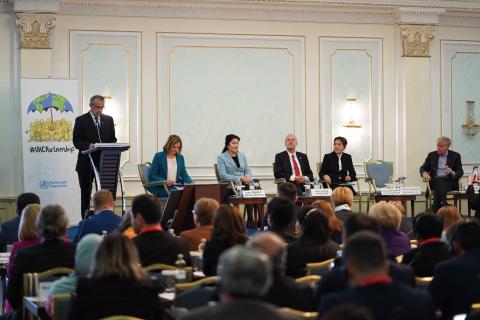Your Excellency Deputy Prime Minister Dr Tamara Duysenova,
Your Excellency Minister Dr Azhar Giniyat, Minister of Healthcare,
Dr Hans Kluge,
Excellencies, Honourable Ministers, Representatives of Member States, dear colleagues and friends,
It is an honour to be with you, especially here in Kazakhstan, the birthplace of primary health care.
As you know, at the United Nations General Assembly last month, world leaders approved a strong political declaration on universal health coverage.
The declaration contains more than 50 commitments to progressively expand access to essential health services;
To reverse the trend of catastrophic out-of-pocket health spending;
And in its first operative paragraph, the declaration affirms primary health care as the cornerstone of universal health coverage.
WHO is now developing our 14th General Programme of Work – our strategy for the next five years – based on five core priorities.
One of those priorities is to support countries to radically reorient their health systems towards primary health care.
But of course, we are not starting from scratch. Through the UHC Partnership, we have already been doing that for more than a decade.
Twelve years ago, WHO joined with Member States and other agencies and organizations - many of you are here today - to create the UHC Partnership.
Today, the UHC Partnership is integrated into the WHO Special Programme on Primary Health Care.
The UHC Partnership has strengthened WHO's capacity in line with the transformation process I initiated several years ago to focus on country impact.
It now has more than 150 high-level health systems experts deployed in more than 120 country and regional offices.
It provides a bottom-up, agile, and needs- and demand-driven approach to deliver for impact.
And it has a strong monitoring, communication and reporting system for accountability and transparency.
At present, the 150 health policy advisers are providing high-level policy and strategic guidance in countries, working on a vast range of actions to reorient health systems towards primary health care.
This includes innovative ways of financing the health sector;
improving health emergency preparedness;
Digitalising the health system;
Developing primary health care investment plans;
And strengthening health and care workforce strategies.
An important aspect of this work is flexibility.
For example, during the COVID-19 pandemic, the health policy advisers worked to maintain essential services, reprogrammed their activities, and many of them served as incident managers in our country offices.
Health policy advisers also support countries to address challenges such as climate and demographic change, health emergencies, and, generally, meeting the growing health needs of populations.
But there are still many challenges and constraints to overcome in many countries to reorient health systems towards primary health care.
These constraints include a lack of health facilities, health workers, basic supplies, drugs and equipment, and in some cases, the lack of safe water, electricity and transport.
That's why this meeting is so timely.
===
Excellencies, dear colleagues and friends,
As we mark the 45th anniversary of the Declaration of Alma-Ata, we’re also celebrating the 75th anniversary of the founding of the World Health Organization.
WHO was born in the aftermath of the Second World War, as the nations of the world came together to affirm that health is a fundamental human right, but also that health is fundamental to peace and security.
That conviction remains as true today as it was in 1948.
We live in a dark time, in a fractured, divided and inequitable world.
As we work to promote, provide and protect the physical and mental health of individuals and communities, we are also working to heal our broken and hurting world.
Now more than ever, we must work together to support countries to realise the right to health as an end in itself, and as the foundation of sustainable development, and a more peaceful and prosperous future.
I thank you.

--
See original post on WHO website